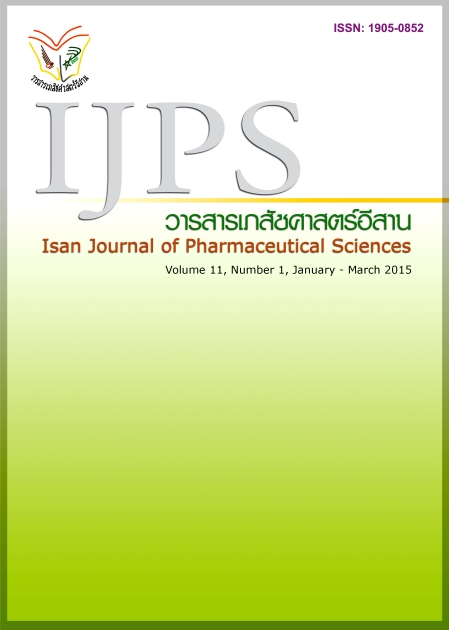Evaluation of Media Literacy Program for Beauty Food Supplements among High School Students
Main Article Content
Abstract
A popularity in slim body and white skin, resulting in the increasing use of beauty food supplements, is a worrisome health issue among Thai teenagers. An important factor influencing these supplement use behavior is the media. It enhances the use of these beauty supplements without concerns about any negative consequences. There is a need for improving media awareness and media literacy among the teenagers. Objective: The purpose of this study was to evaluate the media literacy program for beauty food supplements among high school students. Methods: We conducted a pretest-posttest, stratified randomization, randomized controlled trial. Participants were 11th grade students of Sansaiwittayakom School, Chiang Mai. The 55 students were stratified by their major and sex, then randomly assigned to a control group (28) and an intervention group (27). The intervention group received a media literacy program containing five activities including 1) recreation activities for breaky the ice 2) activities about media accessing and media literacy 3) activities about evaluation of beauty food supplements 4) giving information about beauty food supplement and 5) activities on sharing information about beauty food supplements to other people. Data was collected by a questionnaire containing items assessing knowledge of the beauty food supplements, investigation skills regarding the advertisement, self-efficacy and risk perception, about safety, value and social acceptance. Descriptive statistics and inferential statistics were used. Results: The results showed that an intervention group had a significantly higher self-efficacy score than a control group (different of mean ± SD: 2.11 ± 3.63 vs -2.93 ± 6.87; P = 0.009). Similarly to the knowledge of the beauty food supplements, only in a case of L-carnitine, an intervention group had a significantly higher score than a control group (different of mean ± SD: 1.26 ± 1.16 vs 0.57 ± 1.29; P = 0.040). However, the investigation skills regarding the advertisement and the risk perception about safety, value and social acceptance were not significantly different (P > 0.05). Conclusion: The media literacy program for beauty food supplement can improve among high school students media literacy and self-efficacy.
Article Details
In the case that some parts are used by others The author must Confirm that obtaining permission to use some of the original authors. And must attach evidence That the permission has been included
References
Blackwell RD, Miniard PW, Engel JF. Consumer behavior. 10th ed. Canada: Thomson south-western; 2006.
Chaikoolvatana A, Soontara c. The effect of health education program on high school mastering the media advertisement of dietary supplement among female students in the northeastern Thailand. SMJ 2011; 26 (1): 25-34.
Chirunthom R, Singpaiboonpom N, Ngaodulyawat P, Mongkonsuk S, Mahattanobo S. Factors affecting on decision making on purchasing of dietary supplement: a case study of Hat Yai District, Songkhla Province. Songklanakarin. J Soc Sci & Hum 2007; 13(2): 217-232.
Chuastapanasiri T, editors. Media literacy. Bangkok: Offset Plus; 2011.
Hindin TJ, Contento IR, Gussow JD. A media literacy nutrition education curriculum for head start parents about the effects of television advertising on their children’s food requests. J Am Diet Assoc 2004;104: 192-198.
Khaosod. Tragedy on weight loss, a death of pretty lady. Khaosod Daily 2010 Jun 03;20 (7126).
Kitchanapaibul S. Improper weight loss behavior among Thai adolescentsand young adults. Nursing Journal 2012; 39(4):179-190.
Krutasen U. The development of the media literacy learning’s process approach for the youth leader. Veridian E-Journal 2013; 6(3): 276-285.
Kupersmidt JB, Scull TM, Austin EW. Media literacy education for elementary school substance use prevention: study of media detective. Pediatrics 2010; 23.
National Science and Technology Development Agency. Trends and challenges of dietary supplement industry เท Thailand [Online]. 2013 Apr 17 [cited 2014 Apr 28]. Available from: http://nstda.or.th/blog/?p=24262.
Paeratakul o. Dietary supplement: benefits, risks, and believes. HSRI J 2010; 4(3): 332-336.
Singhirunnusorn c , Arunmuang A. Dietary supplement product consumption beha vior of secondary school students under supervision region 2 of Ministry of Public Health. FDA J 2013; Jan-Apr: 38-47.
Singsai K, Naigowitkhajorn p, Chaiwong A. Knowledge, attitude, and behavior of glutathione using for whitening skin in consumers, Muang District, Chiang Mai Province. Chiang Mai: Faculty of Pharmacy, Chiang Mai University. 2010. [in Thai]
Thai Health Promotion Foundation.Warning for teenagers: food supplements increase risks of low IQ, dullness, nutrition deficiency, and kidney malfunctions [Online]. 2012 Aug 7 [cited 2014 Apr 28]. Available from: http://www.thaihealth.or.th/healthcontent/news/29806.
UNICEF, Faculty of Nursing Chiang Mai University. Communication for development (C4D). Bangkok: UNICEF; 2006.
Yenjabok p. Improving the body of knowledge in media literacy: a study of medias. Bangkok: resource center, Thai Health Promotion;1994.
Yenjabok p. Decoding media awareness: a handbook of media literacy. Bangkok: Offset creation;2009.


